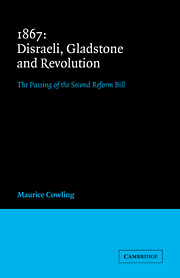Book contents
- Frontmatter
- Contents
- Preface
- Dedication
- Introduction
- I Prelude
- II Preliminary: The uprooting of the Whigs
- III The cornering of the Conservative party
- IV The reassertion of Conservative policy
- V The destruction of Liberal unity
- VI The victory of Disraeli
- VII The public agitation
- VIII The acceptance of Hodgkinson's amendment
- IX Conclusion: Palmerston's mantle
- Epilogue: The limitations of historical knowledge
- Appendixes
- Bibliography
- Notes
- Index
II - Preliminary: The uprooting of the Whigs
Published online by Cambridge University Press: 18 December 2009
- Frontmatter
- Contents
- Preface
- Dedication
- Introduction
- I Prelude
- II Preliminary: The uprooting of the Whigs
- III The cornering of the Conservative party
- IV The reassertion of Conservative policy
- V The destruction of Liberal unity
- VI The victory of Disraeli
- VII The public agitation
- VIII The acceptance of Hodgkinson's amendment
- IX Conclusion: Palmerston's mantle
- Epilogue: The limitations of historical knowledge
- Appendixes
- Bibliography
- Notes
- Index
Summary
‘I never saw thro' a glass so darkly as now in regard to politics. A numerous and hungry Conservative party, a Whig one to which office has become a second nature, and two very clever and very ambitious middle-class men, namely Disraeli and Gladstone, who never can act in the same play and who…never will assist any fusion into which they would respectively be joined.’
Malmesbury to Derby, November 8 1865. Derby MSS Box 146The election of 1865 left the Conservative leaders in a condition of total depression. Once more the Conservative party was the minority party in the House of Commons. In Scotland there had been ‘utter rout’. Spofforth, the chief Conservative agent, could not ‘help expressing my regret that the result is so disastrous’. To Gathorne Hardy, shooting with Colonel Taylor, the chief whip, who found ‘the elections…unaccountable’, it seemed that they ‘have…I fear…almost demolished the party’. Disraeli, offering his own resignation but hinting at Derby's, reflected that ‘the leadership of hopeless opposition is a gloomy affair and there is little distinction when your course [the adjective was perhaps ambiguous] is not associated with the possibility of future power’. To Derby it seemed ‘at the age of sixty-six and after forty-four years of public life, a man may well be content, as I shall be, to take no greater share in public affairs than that which may attach to any personal influence which I may exercise’.As Derby and Disraeli looked out there was only a faint glimmer of hope. Palmerston was eighty:‘his bladder complaint, tho' in itself not fatal, deprives him of his usual exercise, and of sleep which was his forte and carried him through everything.’
- Type
- Chapter
- Information
- 1867 Disraeli, Gladstone and RevolutionThe Passing of the Second Reform Bill, pp. 80 - 118Publisher: Cambridge University PressPrint publication year: 1967

